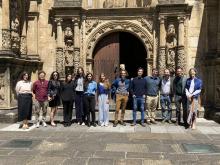Coordinators: Ricardo Valenzuela (Universidad Diego Portales, Chile), Rodrigo Cordero (Universidad Diego Portales, Chile), Matías Guiloff (Universidad Diego Portales, Chile)
Description of the meeting
In the last few years, different initiatives have emerged that have sought to place the question of the role of normative structures in the constitution and stabilization of political and economic institutions at the center of their analysis. Although Latin America has not been aligned to these developments (Merino, 2022; Tecklin, Bauer and Prieto 2011; Perrone, 2021; Alviar, 2021), most of their efforts have remained isolated, and only recently have they begun to move towards the establishment of interdisciplinary collaborative instances beyond the field of economic law. In this context, this workshop seeks first and foremost to serve as a collaborative space to discuss and reflect on the main issues and approaches that have been developed in the region around the intersection between law and political economy. This implies, among other things, mapping the theoretical and methodological developments linked to the study of the legal phenomenon in an interdisciplinary perspective, as well as the research agendas and programs that have emerged in the contemporary context. What are the main problems and research agendas that have been developed around the intersection between law and political economy in Latin America in recent years? What are the theoretical, analytical and methodological yields that have been developed in the Latin American context around research on law and political economy? How are the relations between law and political economy visualized in conflicts over the economic order in the region? These are some of the questions that will guide the discussion during the workshop and that will be addressed from an interdisciplinary perspective in order to contribute to the sociological study of the legal phenomenon. It is, therefore, an exceptional instance, not only for seeking to make visible and link the work of different researchers in this field of study with other similar efforts that have been developed in other contexts, but also for promoting the cross-fertilization of the efforts of different researchers from the region and other regions who dedicate their work to the study of this field of study.
Considering the above, the two-day workshop will be organized around four main themes:
- Problems and research agendas in Latin American socio-legal research.
- Theoretical and methodological innovations in the study of the intersection between law and political economy.
- Imagination, narratives, and the uses of transnational law
- Conflicts and transformations and socio-legal conflicts around the economic order in Latin America: problems and approaches.
Our experience in Oñati
Organizing a workshop at the IISL is a wonderful experience, in many senses. First of all, as to logistics, one of the main challenges any workshop faces is its logistics. However, the IISL has very capable and experienced staff which makes these logistics much easier for the organizers. They arrange every single aspect that they concern, including transportation, lodging and food. Secondly, and closely related, the facilities of the IISL are amazing, not only the rooms where the workshop takes place, but also the technological equipment as amplification system, computers and data. Third, and most important, this staff helps to make the assistant’s experience one that is unique and unforgettable. In order to make a fair description of this experience, it is important to provide some very specific details. The workshop does nor start in the workshop room, but the day before, in which a bus takes all of its participants together from Bilbao to Oñati. Once in Oñati, most of the participants arrive together to Oñati University’s residence, which provides affordable and comfortable accommodation for them. After having time to rest and organize their stuff in their room, all participants have dinner together in a restaurant in Oñati. Only after this, the morning after, the workshop starts. In between it, the group has three other meals together before the workshop’s completion. All this bunch of activities that the group does together, helps to build a very close-knitted community, very motivated to participate in the workshop. Last but not least, the various publication options that the IISL provides for the workshop, help each group to devise the format that is more useful to publish its works.

